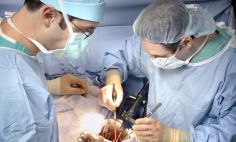Health Topics

A patient's kidney transplant journey
Lupus patient shares organ donation experience with mother
Alison Lee is a fighter. She has fought lupus, kidney failure, and cancer—all in just 35 short years.
Alison was diagnosed with lupus at 16 years old. Lupus is a disease in which your immune system attacks your healthy cells and tissue by mistake. Lupus may affect the kidneys and can lead to kidney failure.
However, Alison didn't experience serious lupus symptoms until she was in her mid-20s, when she started to have anemia (or lack of red blood cells), shortness of breath, and heart issues.
At that point, she was living in New York City and doing things many other 20-somethings do: working, hanging out with friends, and enjoying life.
Kidney failure
But things got worse in 2014 when her lupus started to damage her kidneys. She remembers feeling fatigued and very weak.
"When going to dinner with my friends a few blocks away, I would need to stop and take a break and sit on a bench because I couldn't walk three blocks," Alison said.
She also noticed decreased urine output. Her kidneys started to fail. She remembers feeling fatigued and going in and out of the hospital.
"I would go through an entire day at work without having to pee at all. I knew something was going on," Alison said.
Finally, in 2014, she decided to leave her job because she felt so sick. In 2015, she started kidney dialysis because her kidneys were unable to work well enough to keep her healthy.
"Because my heart had been struggling for so many years, my doctors said it wouldn't be able to handle a kidney transplant," Alison said.
"Dialysis was really difficult for me. At the beginning it was like a full-time job because you need to drain and refill the fluid every four to six hours. It was difficult to have a normal life," she added.
However, the dialysis improved Alison's health dramatically.
Preparing for a transplant
After six months on dialysis, she was healthy enough for a transplant. She had a transplant evaluation and asked family members to be tested to see if any of them would be good potential donors.
Alison was one of the lucky ones when it came to finding a donor. Her mom, sister, and brother all offered to donate.
"Of course, my mom being my mom said she would donate," Alison said.
Her mom wouldn't have it any other way. "My mom is so selfless, and she has helped me throughout all of my health issues in the past," Alison added.
Despite her fears, Alison said the excitement about the future outweighed her concerns about the surgery.
"The whole transplant experience was straightforward and easy. The hospital wanted to make sure I understood everything that was happening with the transplant and also post-transplant," Alison said. "I was more excited about the prospect of the future than scared about the procedure."
After surgery, Alison woke up and had to pee a lot, which was a good sign. It meant her kidney was working well. Her blood work was also positive.
Alison's mom, who was in her sixties at the time, also did well. She was back up and helping take care of Alison during her recovery just three days after surgery.
A difficult recovery
While the transplant surgery was straightforward, Alison's recovery wasn't easy.
About a month after surgery, she discovered a lump growing behind her ear. She ended up contracting lymphoma, a cancer of the lymph nodes. While very rare, a drug Alison needed to prevent rejection of her transplant allowed a slow-growing lymphoma she had before the transplant to transform into a more aggressive lymphoma.
"It's not common, but I had some history of a slow growing lymphoma in my past, so they knew this was a risk. Coupled with my recovery from transplant, I also had to go through the biopsy and the chemo treatment that I did for about four months," Alison said.
Despite the difficult battle of recovery coupled with chemotherapy, Alison's positive attitude and family helped her each step of the way. An unexpected benefit from her chemo was decreased rejection of her transplanted kidney. "The chemo was surprisingly beneficial for my transplant. I was given lots of fluid which helped to keep the new kidney hydrated. Also, the chemo itself essentially killed my immune system, preventing it from attacking the new kidney," Alison said.
The next chapter
Alison is in remission but still deals with related health issues. She works closely with the Lupus Research Alliance, focusing on patient advocacy and sharing her story and message of hope with others. She recommends other people struggling with health issues find a support group or organization.
"It's good for me to interact with other lupus patients. It helps me to feel more comfortable with my disease," Alison said.
Alison also works part time and carves out time to travel and enjoy the little things. She recently traveled to Mexico for a yoga retreat.
"I think a positive attitude is really important," said Alison. "Even through all of this, I've never felt like I was dying or wasn't going to survive. Each issue just becomes another bump that I have to get through until things will get better."






